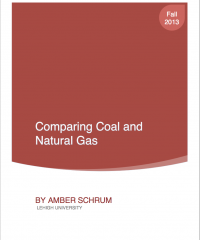Amber Schrum

Integrated Degree in Engineering, Arts and Sciences 2016
Research Paper:
Paper Subheadings:

Introduction:
A comparison of coal, natural gas and alternative energies is important for the hydraulic fracturing boom because it endeavors to remove bias and help the public form opinions unaffected by advertising. In the debate of whether to pursue shale gas resources, it is known that natural gas combusts cleaner than coal, but production emissions are not always considered. An analysis of coal and natural gas from production through use allows the reader to see the big picture of how natural gas will impact the future compared to coal. This comparison strives to address whether natural gas is a transitional fuel to a low carbon economy as industry says, and if it will be used as such.
It is important to provide the public with information beyond industry advertising and environmental group opinions to make educated decisions about what they want to happen in their communities. An educated voting base can also more efficiently interact with politicians to seek legislation and regulation representative of communities’ needs.
Comparing coal, natural gas and alternative energies is important for Lehigh students because the Marcellus Shale in Pennsylvania is a fracking hotspot. While fracking is not occurring in the Lehigh Valley, air and water quality issues can spread from other areas. Lehigh students should consider whether they should pressure the university to divest from companies supporting fracking. Most importantly, Lehigh students are future employees of many industries; business students will determine what to finance and engineering students will foster advancements to make the fracking process more efficient and protect the environment, or they will push toward alternative energies.
For a comparison of coal, natural gas and the potential impact on a move to renewable energy, we will look at scientific uncertainty, methane emissions, the use of these fuels in power plants, the change in U.S. and global emissions, and how coal, gas and renewable energy development are dependent on each other.
In the midst of industry lobbying and advertisements it can be difficult to discover the truth. Such is the case with the comparison of coal, natural gas and alternative energies. There is a substantial amount of scientific uncertainty on how much impact shale gas will have on the environment when compared to coal. There are limited verified, publicly available and peer-reviewed data to make an in-depth analysis of life-cycle emissions for shale gas. Data used in many of the studies previously conducted on this topic are “subject to high levels of uncertainty and may change significantly over time as industry develops” (Broderick et al., 2011, p. 49-50).
